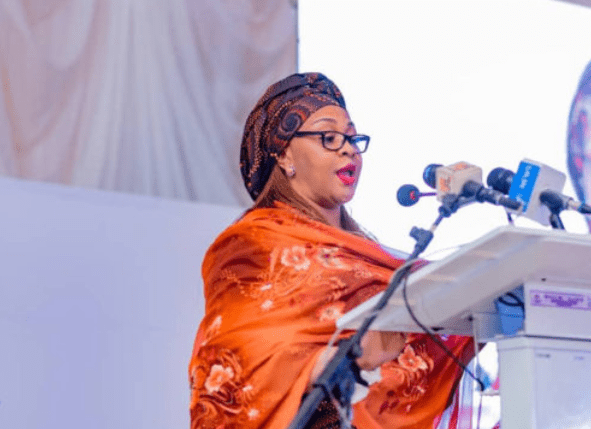
The Minister of State for Transport, Senator Gbemi Saraki, on Thursday blamed the Nigeria Customs Service (NCS) for constituting itself into a hindrance against trade.
Speaking at the 2021 Ministerial Retreat of the Federal Ministry of Transportation (FMOT) in Lagos, Saraki blamed the NCS for Nigeria’s loss of cargoes and revenue to the ports of neighbouring countries.
She also criticized the management of the Nigeria Customs Service for entrenching manual processes at the port, rather than embrace automation.
“Recently, the Customs declared over one trillion naira revenue collected within six months; what I will like to ask is, at what cost did the Customs collect that much revenue?
“Customs has proven itself to be an hindrance to trade facilitation. We cannot compete because we are not efficient, while Benin Republic and Cote d’Ivoire are using scanners, we still opening containers and doing 100 percent examination of cargoes,” she said.
The Minister also blamed corruption and lack of enforcement by security agents for the collapse of the electronic call-up system designed by Nigerian Ports Authority (NPA) to ease the perennial Oshodi/Apapa expressway gridlock.
She stressed the need to fix the important link road to boost maritime business and generate more revenue at the Lagos ports.
“There is urgent need to fix the road to boost businesses at the port and generate more revenue to revitalise the economy.
“The call-up system that was recently put in place has literally collapsed either due to corrupt practices or lack of enforcement by security agents.
“We need to strengthen the institutional capabilities of maritime agencies to position the country as a hub of maritime activities in West and Central Africa to boost the economy,” Saraki said.
She said the maritime sector being a special sector needed efficient and well-trained professionals to ensure effective operation.
Saraki said the job opportunities available in the maritime sector had not been well harnessed by Nigeria.
She said since the last retreat held in Uyo, Akwa-Ibom State, the maritime sector had recorded tremendous achievements in spite of the ravaging COVID-19 pandemic.
Saraki said President Muhammadu Buhari had signed the Suppression of Piracy and Other Maritime Offenses (SPOMO) Bill into law after the first Ministerial Retreat.
She further said there was a need to remove obstacles causing delay in the disbursement of the Cabotage Vessel Financing Funds (CVFF).
“This will assist the local ship owners to grow and contribute to the economy,” she said.
The Minister said maritime trade alone could service the nation’s annual budget, if properly harnessed.
She said the country was lagging behind in the committee of maritime nations when it comes to ship ownership and shipping business.
She added that the country was yet to take full advantage and harness the enormous potential of blue economy and its opportunities for foreign exchange.
Saraki said the National Inland Waterways Authority (NIWA) should focus on enhancing the waterways for a sustainable coastal trade.
She urged the transport agencies to double their efforts in having a validated and approved legal framework such as the National Transport Policy, Maritime Policy and Urban Policy to serve as blueprint for their operations.
Saraki also urged Nigerian Maritime Administration Safety Agency (NIMASA) to ensure a speedy and timely provision of sea-time experience for the trained cadets.
She emphasised that workers in the maritime sector should be properly trained and well motivated.
The Permanent Secretary, Ministry of Transportation, Dr Magdalene Ajani, said the retreat was designed to provide a veritable platform for top management officials to deliberate on how to galvanize the transportation sector to meet set goals and objectives.
“The first phase of this retreat held in August 2019, highlighted achievable plans, initiatives and strategies expected to reposition the maritime subsector and the transportation sector as a whole for improved productivity and better performance.
“This retreat will therefore avail us the opportunity to appraise and take stock of our achievements, identify our constraints, challenges and readjust our strategic plans with a view to enhancing our future performance.
“There is no gainsaying the fact that transportation is one of the critical factors of development at the heart of economic growth and prosperity of any nation.
“In a bid to reposition the Nigerian transportation sector for better performance and enhanced productivity, the ministry embarked on implementation of integrated multi-modal transportation system. The revitalization of policy initiatives and programmes, which are in sync with the nation’s economic development agenda and the National Integrated Infrastructure Master plan,” Ajani said.
She said that there was opportunity for Nigeria to leverage its geographical position, its large domestic market and industrial capacity to become the transportation hub for Africa and the world as a whole.
She urged participants to use the opportunity to surpass the various deliverables and targets set up by the current administration for its performance appraisal.
Ajani said the present administration appraisal was related to the Medium-Term National Development Plan (2021–2025) and the Nigeria Agenda 2050 Plan.